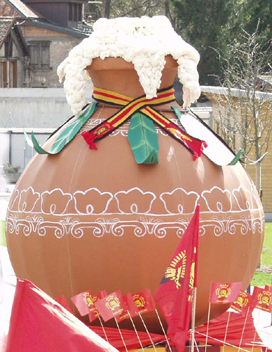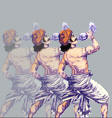Tamil DIASPORA - a Trans State Nation

Nadesan Satyendra
கடல் கடந்தான் எங்கள் தமிழன் - அங்கும்
கற்பூர தீபம் கண்டான் இறைவன்
உடலுக்குப் பொருள் தேடி உள்ளத்தில் இறை நாடி
தமிழுக்கும் பணி செய்து தன்மானத்துடன் வாழ..
- from a lyric by Kavi Arasu Kannadasan  "...சங்கம் வளர்த்த தமிழ் உலகம் எங்கும் இன்று தனி நடை போடுது அம்மா..." Engum Ethilum Thamizhosai Padmashri Isai Mani Dr. Sirkali Govindarajan in London, lyric by Kavi Arasu Kannadasan "...சங்கம் வளர்த்த தமிழ் உலகம் எங்கும் இன்று தனி நடை போடுது அம்மா..." Engum Ethilum Thamizhosai Padmashri Isai Mani Dr. Sirkali Govindarajan in London, lyric by Kavi Arasu Kannadasan
|
Today, more than 70 million Tamil people live in many lands across distant seas.
தமிழன் இல்லாத நாடில்லை -
தமிழனுக் கென்று ஓர் நாடில்லை
"Thamilan illatha Nadu illai -
Thamilanuku endru Oru Nadu illai"
"There is no state without a Tamil -
but there is no state for the Tamils".
Given the armed struggle for Tamil Eelam in the island of Sri Lanka, and the two hundred and fifty thousand (and more) Tamil asylum seekers and refugees in many countries in the world, including Great Britain, USA, Australia, New Zealand, Canada, Netherlands, Germany, France, Italy, Switzerland, Norway, Denmark, Sweden, and Finland it may be tempting to conclude that the dispersal of the Tamils is of recent origin. But that would be wrong.
It is true that the genocidal attack on the Tamil people in 1983 in the island of Sri Lanka and the heightened conflict led to the large numbers of Tamil asylum seekers in the 1980s and 1990s. In the 1980s, for instance, during the period of the Cold War and Germany's relatively liberal asylum policies, many Tamils entered Europe via Germany.
However, as far back as the 1950s, the enactment of the Sinhala Only act in 1956 in Ceylon (as the island of Sri Lanka was then known), the genocidal attacks on the Tamil people in 1958, as well as discriminatory employment policies in the state sector led many Tamil professionals including doctors and engineers, to seek employment in Great Britain, USA, Australia and New Zealand. Later, in 1972, discrimination in respect to University admissions in Sri Lanka, saw a second wave of Tamil professionals leaving the island, to secure not only a future for themselves but also to provide an adequate education for their children.
But, again, the Tamil disapora is not simply the result of oppressive Sinhala rule in the island of Sri Lanka. British colonial rule also dispersed Tamils from their homeland in South India and the North-East of the island of Ceylon (as it was then known ) to many lands.
The abolition of slavery between 1834 and 1873, was followed by the system of indentured labour. The servant 'agreed' to work for a fixed number of years in exchange for a meager wage, plus room and board. The British enacted laws in the colonies to render the breach of the employment 'contract' by the 'servant' a criminal offence punishable with a prison sentence.
In the 1840's Tamils went to Trinidad in the Caribbean, Guyana in South America, and Mauritius off the coast of Africa; in the 1860's to the British colony of Natal in South Africa; in the 1870's to the Dutch colony of Surinam; in the 1880's to Fiji. Others migrated to the French colony of Reunion. Some migrated to Burma now known as Mynmar (and which until 1937 was a province of British India) to work on the plantations or to work as clerks and book keepers. Tamils from Tamil Nadu went to work on the plantations in central Ceylon and in Malaysia. Tamils who had resided in the North of the island of Sri Lanka, went to Malaya and Singapore in search of white collar employment.
The Tamil diaspora is a growing togetherness of more than 70 million people living in many lands and across distant seas, many thousands as refugees and asylum seekers. It is a togetherness rooted in an ancient heritage, a rich language and literature, and a vibrant culture. But it is a togetherness which is not simply a function of the past. It is a growing togetherness consolidated by struggle and suffering and, given purpose and direction by the aspirations of a people for the future - a future where they and their children and their children's children may live in equality and in freedom in an emerging one world.
Here, the comments of Osten Wahlbeck in Transnationalism & Diasporas:the Kurdish Example in 1998, are helpful -
"...The results from the study of Kurdish refugees suggest that refugees sustain transnational social networks and have a diasporic consciousness... The diasporic relations in the refugee communities mean that theories of ethnic relations are difficult to apply to refugee studies. For example, the Kurds did not regard themselves as an ethnic minority within the context of the country of exile; instead their ethnicity was defined within social relations in the country of origin. The label ‘diaspora’ is, perhaps, especially appropriate in the case of the Kurdish refugees because of the influence of Kurdish nationalism, which commits many Kurdish refugees to the restoration of their homeland.
However, this paper suggests that the concept of diaspora can also be a useful analytical tool in the study of other refugee communities. This is because the concept can, at the same time, relate to both the country of settlement and the country of origin. In this way, it can also describe the transnationalism of refugee communities in general.
The dual orientation towards both the country of origin and the country of resettlement is not as contradictory and paradoxical as it seems. In the refugees’ own experiences their country of origin and their country of exile, as well as the time before and the time after migration, constitute a continuous and coherent lived experience.
The separation between before and after migration, as well as the separation between the country of origin and country of exile, is largely forced on the refugees’ experiences by the outside observer.
The concept of diaspora can help the researcher to rethink these issues and to understand the transnational reality in which the refugees are forced to live. Thus, the notion of diaspora can bridge the artificial duality in which the refugee experience is conceptualised..."
Terence Lyons pointed out in Diasporas and Territorial Conflict (March 2004)-
"...Diaspora groups link processes of globalization to conflicts over identity and territory. Globalization has increased cross-border migration and decreased communication and travel costs, thereby making it easier for migrants to build and sustain links between the original homeland and current place of residence. Those forced across borders by war commonly have a specific set of traumatic memories and create specific types of “conflict-generated diasporas” that sustain and sometimes amplify their strong sense of symbolic attachment to the homeland. They build new identities that stress their links to the homeland and often profess an intention to return, once their homeland is “free...”
And Klionsky's remarks in 1998 in Transnationalism, Diaspora & Exiles emphasise the increasing significance of transnationalism -
"...Transnationalism refers to sustained ties of persons, networks, and organizations across nation-state borders, arising out of international migration patterns and refugee flows (Faist, 2000). The recent global transformations in economic relations, ethnic conflicts, and communication technology have led to the creation of new transnational kinship groups, transnational social circuits, and transnational communities. By expanding borders across nations and creating new social ties, the concepts pertaining to cultural spheres, acculturation, cultural retention, and citizenship are started to change drastically. People and their ideas are moving more freely back and forth across global borders than ever before. This ebb and flow, through easy travel and growing communications technology, may be reshaping the traditional concept of a nation. In fact, some people with homes in two countries are showing an amazing capacity to maintain dual identities -- with strong cultural ties and contributions to both places .."
The words of Elise Boulding in Building Peace in the Middle East, 1994 quoted by Kevin Kusawa in Finding the Kurds a Way: Kurdistan and the discourse of the nation-state serve as a pointer to the future.
"..Groups of people are solidifying their identities outside of the state, and the twenty-first century will see new configurations of non governmental, inter governmental, and UN structures.."
The digital revolution in which we live is helping to advance Tamil togetherness. Globalisation and localisation are taking place at the same time. Tamils living in many lands and across distant seas are communicating with one another through internet newsgroups and mailing lists. Tamil web sites continue to multiply. And so do Tamil newspapers, periodicals and radio broadcasts on the web.
" Two decades ago, people moving from home countries to other countries would not have had the opportunity to remain actively engaged or even adequately informed of events in their home countries. Policy makers and scholars had a somewhat limited understanding of diasporic communities and their importance. Today, with the diminished saliency of the nation-state, the impact of globalization and the growing number of transnational migrants, this has changed. Diasporic groups, capable of maintaining and investing in social, economic and political networks that span the globe, are of increasing relevance and interest to policy makers in home countries as well as host countries..." Diaspora Circulation & Transnationalism as Agents for Change in the Post Conflict Zones of Sri Lanka - R.Cheran, University of Toronto, September 2003
When the Soc.Culture.Tamil newsgroup was founded about a decade ago, its Charter declared:
"What would be the role of Tamil language for the next millennium? Tamils around the world have a strong desire to establish a newsgroup on the Usenet to share their views on Tamil history, ancient and modern literature, ancient Tamil civilization, Tamil culture, religion, art, drama, philosophy and related topics. The proposed newsgroup is intended to serve as a niche for the Tamil language and culture in the electronic communication network."
There are today several hundred Tamil discussion groups (and blogs) in cyber space and this number continues to grow. Tamil dot Net, the Forum Hub, Dr. Jayabharathi's Agathiyar and Dr.N.Kannan's Esuvadi have grown to become important discussion fora enabling subscribers to communicate both in Tamil and in English.
Thomas Hylland Eriksen commented in Nations in Cyberspace in March 2006 -
"..the Internet is fast becoming a major medium for the consolidation, strengthening and definition of collective identities, especially in the absence of a firm territorial and institutional base. Some of the nationalist groups that appear to be most active on the Internet are Sri Lankan Tamils, Kurds, Palestinians... The most important transnational voice for Tamil independence may be the websites TamilNet (www.tamilnet.com ) and Tamilnation (www.tamilnation.org ), which are updated frequently..."
Again the impact of the struggle for Tamil Eelam, and the togetherness reflected in பொங்கு தமிழ் and Maha Veerar Naal, in nurturing Tamil national consciousness cannot be under estimated. The words of Tamil Eelam leader Velupillai Pirabaharan continue to receive an answering response from Tamils living in many lands and across distant seas -
"உலகெங்கும் தமிழன் பரந்து வாழ்ந்தாலும்.. தமிழீழத்திலேதான் தனியரசு உருவாகும் வரலாற்றுப் புறநிலை தோன்றியுள்ளது..."
What is a trans state nation? A trans state nation is a cultural, economic and political togetherness of a people living in many lands and across distant seas. It is a togetherness consolidated by struggle and suffering. It is not an 'idealism' expressed only in word. It is a political togetherness expressed in tangible deed. It is a togetherness directed to secure the aspirations of a people for equality and freedom - finding expression in establishing, nurturing and maintaining governmental or non governmental networks or institutions necessary for that purpose. And Montserrat Guibernau was right to point out in Nations without States: Political Communities in a Global Age
"...The task of intellectuals in nations without states involves the constant actualization of the nationalist ideology to respond to the community's needs. His or her job is one of service to society..."
Again, all this, is not to say that a people should not at the same time, work toward the ideal of a 'one world' where the separate national identities of the world are transcended by a greater unity. However, that unity will not come by the suppression of one nation by another. It will come from truly understanding the timeless force of that which Kanniyan Poongundran said in the Purananuru, some 2500 years ago -
"To us all towns are one, all men our kin.
Life's good comes not from others' gift, nor ill
Man's pains and pains' relief are from within.
Death's no new thing; nor do our bosoms thrill
When Joyous life seems like a luscious draught.
When grieved, we patient suffer; for, we deem
This much - praised life of ours a fragile raft
Borne down the waters of some mountain stream
That o'er huge boulders roaring seeks the plain
Tho' storms with lightnings' flash from darken'd skies
Descend, the raft goes on as fates ordain.
Thus have we seen in visions of the wise ! -
We marvel not at greatness of the great;
Still less despise we men of low estate."Kanniyan Poongundran in Purananuru,
Poem 192 - written in Tamil 2500 years ago
English Translation by Rev. G.U.Pope
in Tamil Heroic Poems
யாதும் ஊரே ; யாவரும் கேளிர் ;
தீதும் நன்றும் பிறர்தர வாரா ;
நோதலும் தணிதலும் அவற்றோ ரன்ன ;
சாதலும் புதுவது அன்றே ; வாழ்தல்
இனிதுஎன மகிழ்ந்தன்றும் இலமே; முனிவின்,
இன்னா தென்றலும் இலமே; ‘மின்னொடு
வானம் தண்துளி தலைஇ, ஆனாது
கல்பொருது இரங்கும் மல்லற் பேர்யாற்று
நீர்வழிப் படூஉம் புணைபோல, ஆருயிர்
முறைவழிப் படூஉம்’ என்பது திறவோர்
காட்சியின் தெளிந்தனம் ஆகலின், மாட்சியின்
பெரியோரை வியத்தலும் இலமே;
சிறியோரை இகழ்தல் அதனினும் இலமே.
192, எட்டுத்தொகை நூல்களில் ஒன்றாகிய
புறநானூறு - பாடியவர்: கணியன் பூங்குன்றன்






